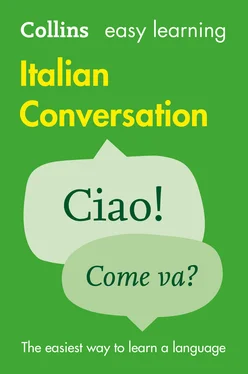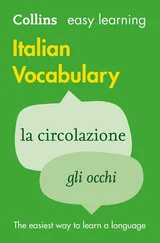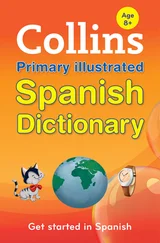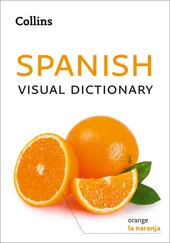| Come si chiama? |
What’s Your name? |
| Ciao! E tu come ti chiami? |
Hi! What’s your name? |
| Come si chiamasua m o glie? |
What’sYour wife’s name? |
| Come vi chiamate? |
What areyour names? |
| Dove a bita? |
Wheredo You live? |
| Dovelavora? |
Wheredo You work? |
| Dov’ è il suo uff i cio? |
Whereis Your office? |
| Di dovesei? |
Wheredo you come from? |
| Quandoarrivi? |
Whenwill you get here? |
| Quandoparte? |
Whenare You leaving? |
| Quandoci troviamo? |
What timeare we meeting? |
| Quand’ è il tuo compleanno? |
Whenis your birthday? |
If you want to ask how long someone has been doing something, use Da quanto tempo…?or just Da quanto…?( How long … for? ) followed by the present tense. For more information on the present tense, see here.
| Da quanto tempolavori qui? |
How long haveyou been working here? |
| Da quanto tempoè sposata? |
How long haveYou been married? |
| Da quantostai in It a lia? |
How long haveyou been in Italy? |
Sometimes you’ll want to ask why a friend or acquaintance did or didn’t do something. You can use Perché…?( Why…? ) and the past tense to ask. For more information on the past tense, see here.
| Perchéhai cambiato casa? |
Whydid you move house? |
| Perchési è licenziata? |
Whydid You quit your job? |
| Perché nonmi hai telefonato? |
Whydid n’tyou call me? |
| Perché nonc’è andata? |
Whydid n’tYou go? |
SAYING WHAT YOU WANT TO DO
When you’re talking to friends or colleagues you will often need to be able to talk about what you would like to do. To say what you want to do, use vorrei( I’d like ). vorreicomes from the verb volere( to want ). For more information on volere, see here.
| Vorreiringraziarla dell’aiuto. |
I’d like tothank You for your help. |
| Vorreiparlare con la signora Martini, per favore. |
I’d like tospeak to Mrs Martini, please. |
| Vorremmoinvitarvi a bere qualcosa. |
We’d like totake you out for a drink. |
| Vorremmopresentarle un amico. |
We’d likeYou tomeet a friend of ours. |
You can also use voglio( I want ) to talk about what you want to do. If you want to say that you want someone to do something, you use voglio chefollowed by the subjunctive. For more information on the subjunctive, see here.
| Voglioorganizzare una festa. |
I want toorganize a party. |
| Voglioinvitare un po’ di amici per il mio compleanno. |
I want tohave a few friends over for my birthday. |
| Voglio chetu venga con me. |
I wantyou tocome with me. |
| Voglio chela serata vada bene. |
I wantthe evening tobe a success. |
One easy way of making suggestions to your friends and colleagues is to use si potrebbe( we could ) followed by the verb in the infinitive. potrebbecomes from the verb potere( to be able ). For more information on potere, see here.
| Si potrebbechi e dere a Paul di venire con noi. |
We couldask Paul to join us. |
| Si potrebbeuscire a bere qualcosa insieme. |
We couldgo out for a drink. |
| Ci si potrebbeincontrare un’altra volta. |
We couldmeet another time. |
| Ci si potrebbetrovare al Caffè San Marco. |
We couldmeet at the Caffè San Marco. |
Just as in English you can make a suggestion by simply asking Perché non …?( Why don’t …? ).
| Perché nonci troviamo uno di questi giorni? |
Why don’twe get together sometime? |
| Perché noninvitiamo F a bio e la sua ragazza? |
Why don’twe invite Fabio and his girlfriend? |
| Perché nonli chiami? |
Why don’tyou phone them? |
| Perché nonviene a pranzo con me? |
Why notmeet me for lunch? |
You can also make a suggestion using the Italian phrase E se…?( How about…? ) which is followed by a verb in the imperfect subjunctive. For more information on the subjunctive, see here.
| E seli invit a ssimo a cena? |
How aboutasking them round for dinner? |
| E sevenisse con noi? |
How aboutif You came with us? |
| E sepassassi a pr e nderti la mattina? |
How aboutif I picked you up in the morning? |
Use Dovrei…?( Should I…? ) followed by the verb in the infinitive to ask if you should do something. dovreicomes from the verb dovere( to have to ). For more information on dovere, see here.
| Dovreiinvitare Anna? |
Should Iinvite Anna? |
| Dovreirichiamarla? |
Should Icall her back? |
| Dovreiscusarmi? |
Should Iapologize? |
When talking to people in a social or work situation, you may wish to express your opinion of something. In Italian you can use credoor penso( I think ). When you use credereand pensarewith che, the verb which follows is in the subjunctive. For more information on the subjunctive, see here.
Читать дальше












